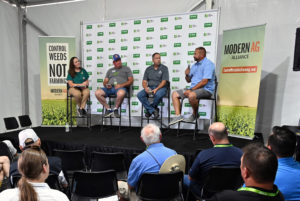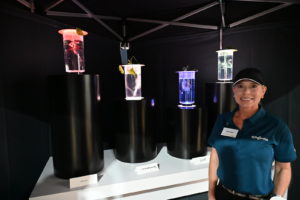
L-R: Martha Smith, Bayer; farmer Dave Struthers; Ben Gleason, Iowa Agribusiness; and farmer Kevin Ross
Bayer sponsored a panel at Farm Progress Show to highlight the alliance and its purpose. Martha Smith, Bayer VP of Stakeholder Relations, says the alliance includes many state ag groups working on specific legislation in their areas. “There’s been legislation that has been filed in a few states, including here in Iowa and down South in Missouri and out West in Idaho. And the alliance has been supporting the efforts of those legislators to again protect farmers access to crop protection tools,” said Smith.
Iowa farmer Kevin Ross, former president of the National Corn Growers Association, says if farmers lose an important crop protection tool like glyphosate, the impact goes beyond the farm. “There are certainly other chemistries out there right now that people use to control weeds, but if you start taking away one, especially one that’s proven safe and one that again has been around 50 years, if we started reducing the amount of tools that a farmer needs, I think we have major problems ahead from a production standpoint,” said Ross. “That trickles down to industries and costs other consumers down into other economies as well.”
Others on the panel included Iowa farmer Dave Struthers, and Ben Gleason, executive director of the Iowa Agribusiness Association, one of the Alliance members. Listen to their discussion and interviews with Smith, Ross, and Gleason below.
Panel discussion – Martha Smith, Bayer; Kevin Ross, Iowa farmer; Ben Gleason, Iowa Agribusiness Assoc., Dave Struthers, Iowa farmer
FPS24 - Modern Ag Alliance panel 16:35
Interview with Martha Smith, Bayer
FPS24 - Modern Ag Alliance Martha Smith, Bayer 5:14
Interview with Ben Gleason, Iowa Agribusiness Assoc.
FPS24 - Modern Ag Alliance Ben Gleason, Iowa Agribusiness 6:19
Interview with Kevin Ross, Iowa farmers
FPS24 - Modern Ag Alliance Kevin Ross, farmer 5:44











